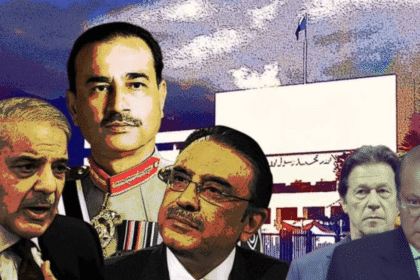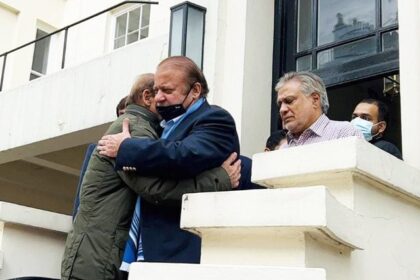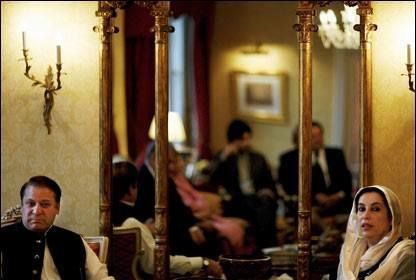The start of this month was undeniably eventful. High-tech jets flew overhead, ballistic missiles were launched, nuclear capabilities were flaunted in fiery speeches, and a meme war raged across social media. Despite national television channels bursting with breaking news, one story never quite took flight and remained grounded—overshadowed by the chaos of cross-border operations, like a whisper lost in a storm.
That was the Supreme Court’s decision on military trials—a verdict deserving far more attention than it received. It was a ruling with far-reaching consequences, yet it failed to ignite headlines or capture the public’s attention.
The 9th May 2023 incident sent ripples through Pakistan’s political landscape that continue to create waves even two years later. Supporters of Pakistan Tehreek-e-Insaf (PTI) took to the streets in large numbers and targeted multiple military installations across the country. Among these, the attack on the Corps Commander’s residence in Lahore stood out. This incident ignited a legal debate that continues to this day.
In May 2023, Pakistan’s military and government authorities announced their decision to try civilians involved in the 9 May incident in military courts under the Official Secrets Act, 1923 (OSA) and the Pakistan Army Act, 1952 (PAA). Since then, more than 100 PTI activists have been sentenced by military courts. Transferred to military custody for their actions, 85 of them were convicted and given terms ranging from two to ten years of rigorous imprisonment.
In June 2023, this decision was challenged by many, including former Chief Justice Jawad S. Khawaja, who filed a petition against the constitutionality of the trials and took the matter to the apex court.
Eventually, in October 2023, the Supreme Court ruled that the trial of civilians in military courts was a violation not only of the fundamental rights provided by the Constitution but also of the rights protected under international conventions and treaties to which Pakistan is a party. It was a 4–1 majority decision against the conduct of military trials for civilians.
Earlier this month, however, that decision was overturned by a 5–2 verdict of a constitutional bench. In this judgement, the Court not only reinstated the relevant provisions of the Pakistan Army Act, 1952, but also reaffirmed that the trials conducted of the 9 May culprits were lawfully undertaken. The decision further mandated the government to introduce a provision for appeals to high courts against the verdicts of military courts.
Although this was a short order and the full judgement is yet to be released, the decision appears no less draconian than the Provisional Constitutional Orders (PCOs) issued under Pervez Musharraf or Zia-ul-Haq. It harks back to the era of Ayub Khan’s martial law, when military tribunals were established and civilians were subject to court martial. This constitutes nothing less than a judicial surrender by the apex court itself.
While not unprecedented—given previous Supreme Court decisions upholding military trials of non-military personnel, such as District Bar Association Rawalpindi v. Federation of Pakistan (2015), which endorsed expedited military trials of terrorists following the 2014 APS Peshawar attack—this latest decision seems unparalleled. Unlike past instances, the individuals implicated in this case are not terrorists. They are citizens of the state, whose rights the court is constitutionally bound to protect.
This decision represents a profound violation of the basic principles of justice and fairness. Regardless of the crimes committed, an ordinary civilian should be tried in civilian courts. A key critique lies in the violation of the right to a fair trial—an undeniable constitutional entitlement under Article 10A. This right is stripped away when civilians are tried behind closed doors in military courts, where due process is often compromised and the focus lies more on delivering swift punishment than ensuring justice. Moreover, public hearings—a recognised international standard—are violated through such secretive proceedings.
Proponents of these trials argue that the use of military tribunals for civilians is not without precedent globally. In 2001, the United States, while combating terrorism, conducted military trials that yielded expedited outcomes and swift remedies. However, even in the now-overturned ruling by Justice Jawad S. Khawaja, Justice Ayesha Malik noted that military courts fail to meet the standards set by the Constitution under Article 10A. They lack reasoned judgements, conduct closed-door hearings, and often compromise the right to prepare a defence.
The establishment of these tribunals also undermines public confidence in Pakistan’s judiciary. It raises concerns about the competence of the existing civilian courts. Civilian courts are capable of trying these individuals, and allowing military courts to function in parallel effectively declares that the country’s criminal justice system has failed.
Furthermore, the US military trials referenced were directed at suspects involved in the September 11 attacks—individuals with proven links to terrorist organisations. In contrast, the accused in this case are supporters of one of the largest political parties in Pakistan.
By allowing military courts to try civilians, the Supreme Court has opened the door to a future where the independence of the civilian judiciary is severely compromised. While the long-term repercussions of this decision are yet to unfold, it already stands as one of those rulings that will be remembered for casting a lasting stain on the credibility of our judiciary.
















